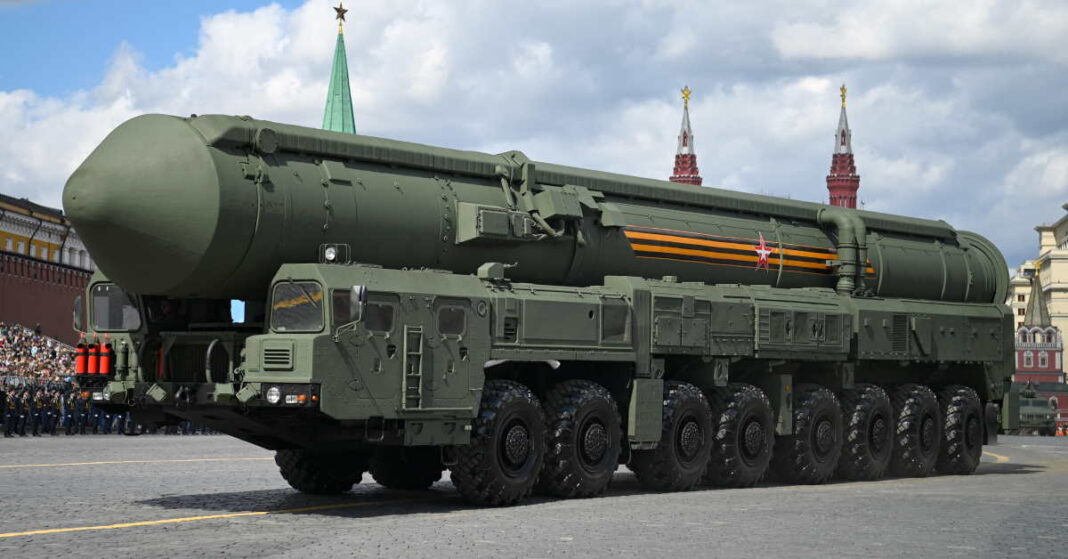Russian President Vladimir Putin has said he is ready to use nuclear weapons to defend Russian territory, raising the fear he might use a small, or “tactical” nuclear weapon in Ukraine.
U.S. President Joe Biden has warned that doing so would be the most serious military escalation since World War II, the BBC reports.
Tactical nuclear weapons are small nuclear warheads and delivery systems intended for use on the battlefield, or for a limited strike.
They are designed to destroy enemy targets in a specific area without causing widespread radioactive fallout.
The smallest tactical nuclear weapons can be one kiloton or less (producing the equivalent to 1,000 tonnes of the explosive TNT). The largest ones can be as big as 100 kilotons.
Strategic nuclear weapons are larger (up to 1,000 kilotons) and are launched from longer range.
The atomic bomb that the U.S. dropped on Hiroshima in 1945 was 15 kilotons.
What tactical nuclear weapons does Russia have?
According to U.S. intelligence, Russia has about 2,000 tactical nuclear weapons.
Its tactical nuclear warheads can be placed on various types of missiles that are normally used to deliver conventional explosives, such as cruise missiles and artillery shells.
Tactical nuclear weapons can also be fired from aircraft and ships — as anti-ship missiles, torpedoes, and depth charges.
The U.S. says Russia has recently been investing heavily in these weapons to improve their range and accuracy.
Have tactical nuclear weapons been used before?
Tactical nuclear weapons have never been used in conflict.
Nuclear powers such as the U.S. and Russia have found it equally effective to destroy targets on the battlefield by using modern conventional munitions.
In addition, no nuclear-armed country has so far been willing to risk unleashing all-out nuclear war by employing tactical nuclear weapons.
However, Russia might be more willing to use smaller tactical weapons than larger strategic missiles.
“They might not see it as crossing this big nuclear threshold,” says Patricia Lewis, head of the international security program at the Chatham House think tank.
“They could see it as part of their conventional forces.”
In February 2022, shortly before invading Ukraine, Putin placed Russia’s nuclear forces at “special combat readiness” and held high-profile nuclear drills.
More recently, he said: “If the territorial integrity of our country is threatened, we will without a doubt use all available means to protect Russia and our people. This is not a bluff.”
Russia is planning to annex the regions of southern and eastern Ukraine it has occupied after holding self-styled referendums. Putin says he is ready to defend the “territorial integrity” of the regions “by all means.”
U.S. intelligence sees this as a threat to the West to avoid helping Ukraine try to retake these territories, rather than as a sign that he is planning a nuclear war.
But others worry that Russia, if it suffers further setbacks, might be tempted to use a smaller tactical weapon in Ukraine as a “game changer”, to break a stalemate or avoid defeat.
James Acton, a nuclear expert at the Carnegie Endowment for International Pace in Washington DC, says: “I am legitimately worried that in that circumstance, Putin might use a nuclear weapon — most likely on the ground in Ukraine to terrify everyone and get his way. We are not at that point yet.”
US President Joe Biden has warned Russia not to use nuclear weapons in the war in Ukraine.
Speaking during an interview with CBS News, Biden said such action would “change the face of war unlike anything since World War Two,” adding: “It’ll be consequential.”
How the US and NATO would respond to any nuclear use is hard to predict. They may not want to escalate the situation further and risk all-out nuclear war, but they might want to draw a line.
However, Russia might also be deterred from using tactical nuclear weapons by another power — China.
“Russia is heavily dependent on Chinese support,” says Heather Williams, nuclear expert at Kings College London.
“But China has a ‘no first use’ nuclear doctrine. So if Putin did use them, it would be incredibly difficult for China to stand by him.
“If he used them, he would probably lose China.”


